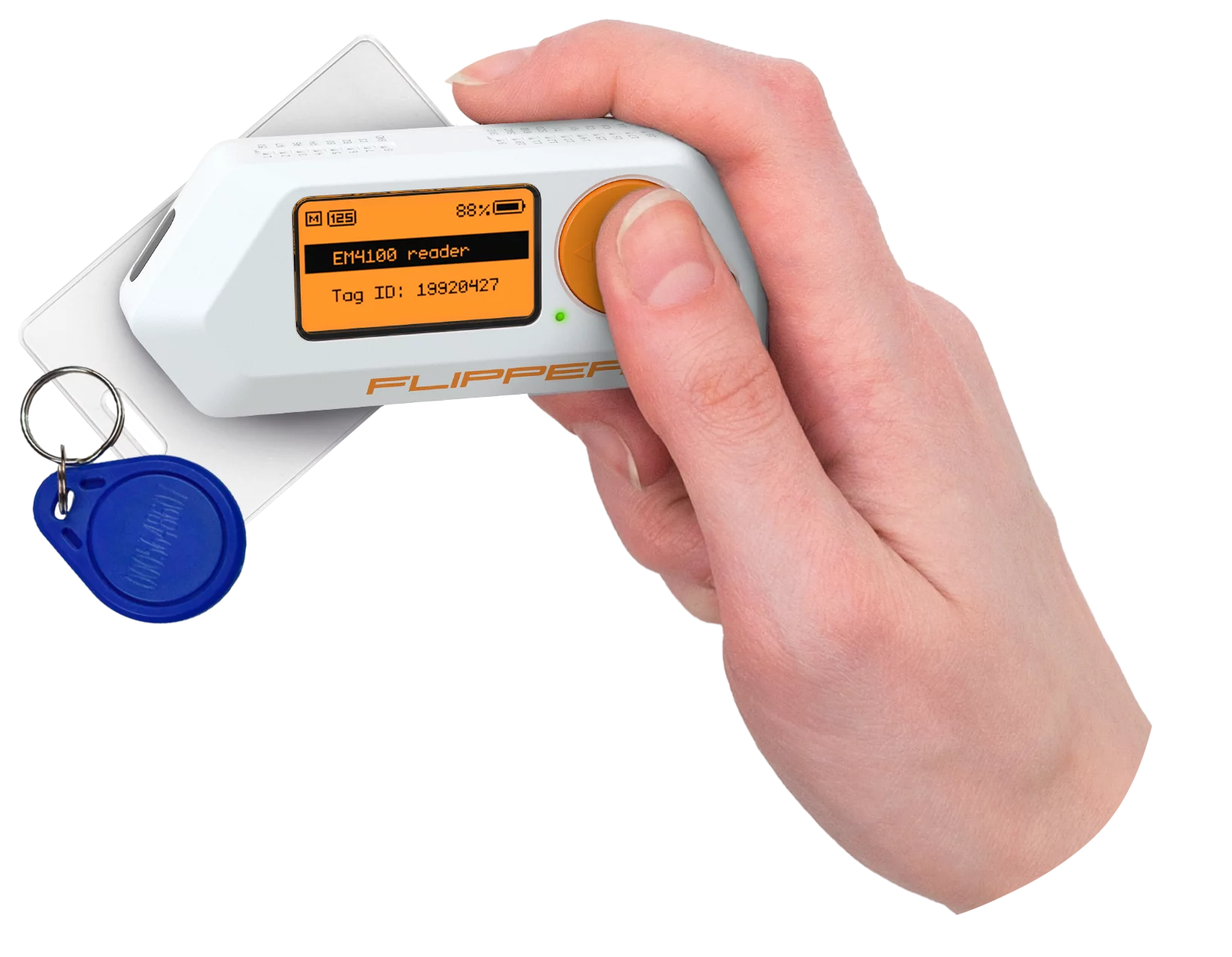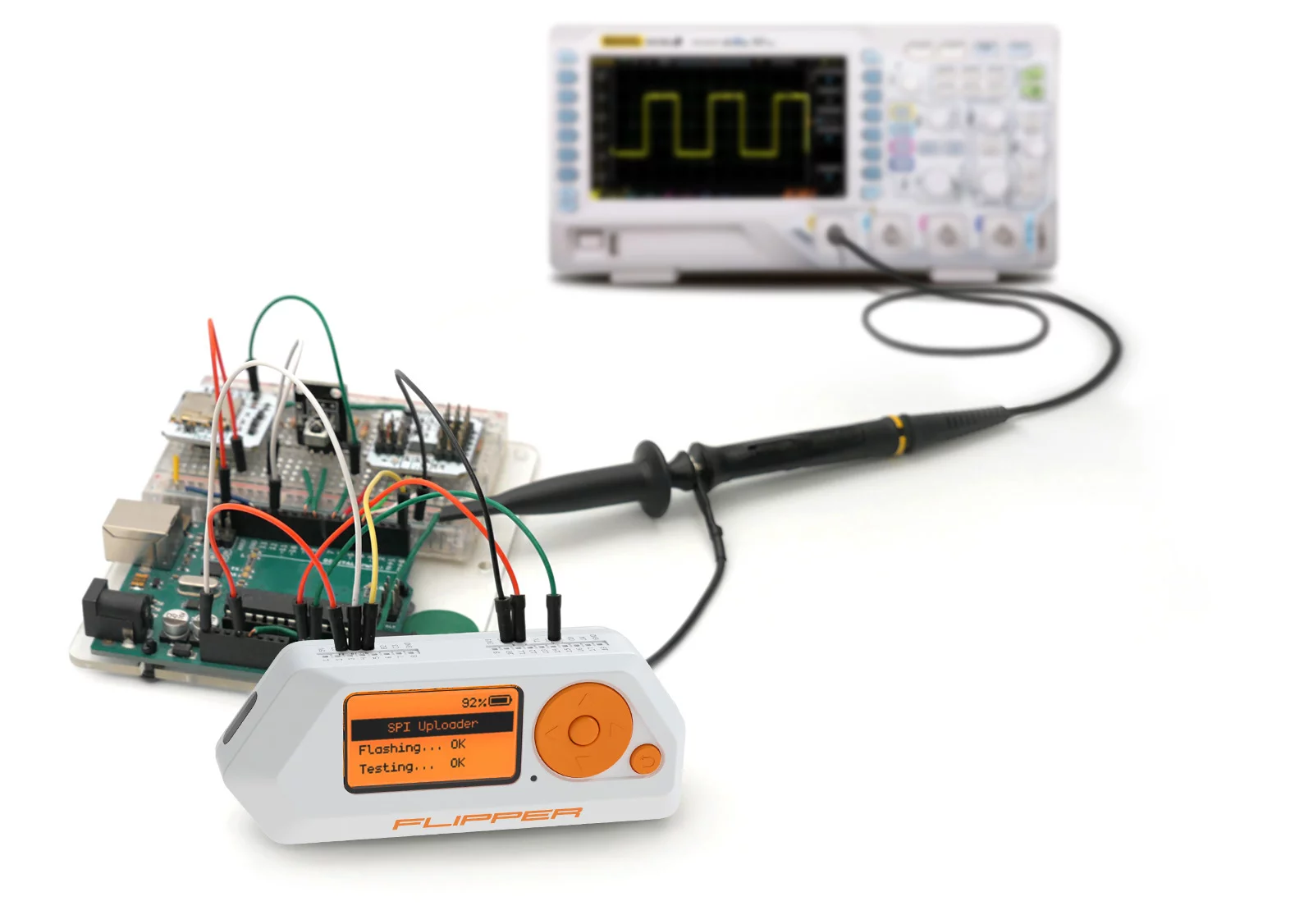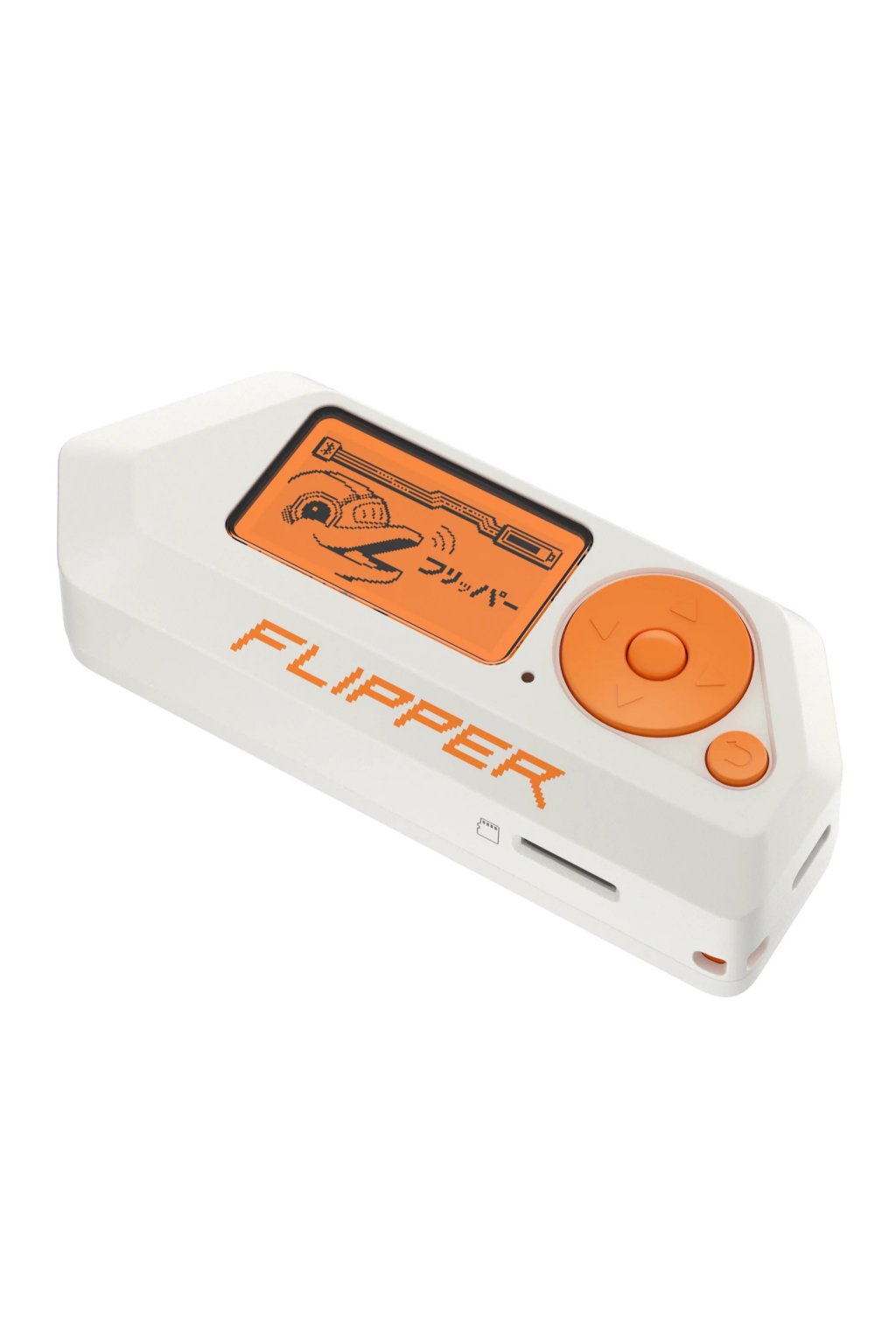Flipper Zero
Flipper Zero is a portable multi-tool for pentesters and geeks in a toy-like body. It loves hacking digital stuff, such as radio protocols, access control systems, hardware and more. It's fully open-source and customizable, so you can extend it in whatever way you like.
| Category: | Pentesting |
|---|---|
| Weight: | 0.1 kg |
What is Flipper Zero
Your cyber buddy
The idea of Flipper Zero is to combine all the hardware tools you'd need for exploration and development on the go. Flipper was inspired by pwnagotchi project, but unlike other DIY boards, Flipper is designed with the convenience of everyday usage in mind — it has a robust case, handy buttons, and shape, so there are no dirty PCBs or scratchy pins. Flipper turns your projects into a game, reminding you that development should always be fun.

Flipper Zero is completely autonomous and can be controlled from a 5-Position directional pad without additional devices, such as computers or smartphones. Common scripts and functions are available from the menu.
For more control, you can connect to Flipper via USB. Instead of a TFT/IPS/OLED, we decided to build in a cool old-school LCD screen, which is perfectly visible in sunlight and has an ultra-low power consumption of 400nA with the backlight turned off.
For more control, you can connect to Flipper via USB. Instead of a TFT/IPS/OLED, we decided to build in a cool old-school LCD screen, which is perfectly visible in sunlight and has an ultra-low power consumption of 400nA with the backlight turned off.

Sub-1 GHz Transceiver
Sub-1 GHz Range
This is the operating range for a wide class of wireless devices and access control systems, such as garage door remotes, boom barriers, IoT sensors and remote keyless systems.
Flipper has an integrated 433MHz antenna, and a CC1101 chip, which makes it a powerful transceiver capable of up to 50 meters range.
Flipper has an integrated 433MHz antenna, and a CC1101 chip, which makes it a powerful transceiver capable of up to 50 meters range.
Customizable radio platform
CC1101 is a universal transceiver designed for very low-power wireless applications. It supports various types of digital modulations such as 2-FSK, 4-FSK, GFSK and MSK, as well as OOK and flexible ASK shaping. You can perform any digital communication in your applications such as connecting to IoT devices and access control systems.
Oh, and one more thing — Flipper uses 433 MHz to communicate with other Flippers out there, so you can make some cyber-dolphin friends :)
125kHz RFID

Low-frequency proximity cards
This type of card is widely used in old access control systems around the world. It's pretty dumb, stores only an N-byte ID and has no authentication mechanism, allowing it to be read, cloned and emulated by anyone. A 125 kHz antenna is located on the bottom of Flipper — it can read EM-4100 and HID Prox cards, save them to memory to emulate later.
You can also emulate cards by entering their IDs manually. Moreover, Flipper owners can exchange card IDs remotely.
NFC
High-frequency proximity cards
Flipper Zero has a built-in NFC module (13.56 MHz). Along with the 125kHz module, it turns Flipper into an ultimate RFID device operating in both Low Frequency (LF) and High Frequency (HF) ranges. The NFC module supports all the major standards.
It works pretty much the same as the 125 kHz module, allowing you to interact with NFC-enabled devices — read, write and emulate HF tags.
It works pretty much the same as the 125 kHz module, allowing you to interact with NFC-enabled devices — read, write and emulate HF tags.
Bluetooth
Connect to apps
Flipper Zero has a built-in Bluetooth Low Energy module. As with other Flipper wireless features, manufacturer will be providing an open source library for adding Flipper support to community-made apps.
Full BLE support allows Flipper Zero to act as both a host and a peripheral device, allowing you to connect your Flipper to 3rd-party devices and a smartphone simultaneously.
Manufacturer's mobile developers are designing official iOS and Android apps to let you unleash Flipper's potential with a larger screen and greater control.
Infrared Transceiver
Infrared Transmitter
The infrared transmitter can transmit signals to control electronics such as TVs, air conditioners, stereo systems and more. Flipper has a built-in library of common TV vendor command sequences for power and volume control. This library is constantly updated by Flipper community users uploading new signals to Flipper’s IR Remote database.
Infrared learning feature
Flipper Zero also has an IR receiver that can receive signals and save them to the library, so you can store any of your existing remotes to transmit commands later, and upload to the public IR Remote database to share with other Flipper users.
MicroSD Card
External storage for apps and data
There is lots of heavy data Flipper has to store: remotes codes, signal databases, dictionaries, image assets, logs and more. All this data can be stored on an SD card, as well as user plugins.
The SD slot will have a push-push type connector, so the card will be reliably secured inside and won't stick out. Flipper Zero will support any FAT32 formatted microSD card to store your assets so you’ll never have to worry the memory will run out. The card is not required for Flipper Zero to operate and is not included.
Tool for Hardware Exploration
Flipper Zero is a versatile tool for hardware exploration, firmware flashing, debugging, and fuzzing. It can be connected to any piece of hardware using GPIO to control it with buttons, run your own code and print debug messages to the LCD display. It can also be used as a regular USB to UART/SPI/I2C/etc adapter.

Completely Autonomous
Built-in 5V and 3.3V power pins. Control from built-in buttons and display, no PC required.
SPI/UART/I2C to USB converter
Communicate with any hardware from your desktop application.
Firmware flashing tool
Flash any kind of SPI memory, such as EEPROM.
Fuzzing tool
Test any protocols and signals.
iButton
1-Wire keys (Touch Memory)
Flipper Zero has a built-in 1-Wire connector to read iButton (aka DS1990A, Touch Memory or Dallas key) contact keys. This old technology is still widely used around the world. It uses the 1-Wire protocol that doesn't have any authentication. Flipper can easily read these keys, store IDs to the memory, write IDs to blank keys and emulate the key itself.
Flipper Zero has a unique contact pad design on the corner — its shape works as a reader and a probe to connect to iButton sockets at the same time. This mode is also handy for silently intercepting the 1-Wire data line.
Tech spec
MCU (Microcontroller unit)
Model: STM32WB55RG
ARM Cortex-M4 32-bit 64 MHz (application processor)
ARM Cortex-M0+ 32 MHz (network processor)
Flash: 1024 KB
SRAM: 256 KB
ARM Cortex-M4 32-bit 64 MHz (application processor)
ARM Cortex-M0+ 32 MHz (network processor)
Flash: 1024 KB
SRAM: 256 KB
Display
LCD Monochrome
Resolution: 128x64 px
Controller: ST7565R
Interface: SPI
Diagonal Size: 1.4“
Resolution: 128x64 px
Controller: ST7565R
Interface: SPI
Diagonal Size: 1.4“
Battery
LiPo 2000 mAh
7 days approximately
Sub-1 GHz module
Chip: TI CC1101
TX Power: 0 dBm max
Frequency bands (depends on your region):
● 315 MHz
● 433 MHz
● 868 MHz
● 915 MHz
TX Power: 0 dBm max
Frequency bands (depends on your region):
● 315 MHz
● 433 MHz
● 868 MHz
● 915 MHz
NFC
Frequency: 13.56 MHz
Supported cards:
● ISO-14443A/B
● One well-known brand
● FeliCa™
● NFC Forum protocols
Supported cards:
● ISO-14443A/B
● One well-known brand
● FeliCa™
● NFC Forum protocols
RFID 125kHz
Frequency: 125 kHz
Modulation: AM, PSK, FSK
Supported cards:
● EM400x, EM410x, EM420x
● HIDProx, Indala
Modulation: AM, PSK, FSK
Supported cards:
● EM400x, EM410x, EM420x
● HIDProx, Indala
GPIO
3.3 CMOS Level
Input 5V tolerant
Up to 20 mA per digital pin
Input 5V tolerant
Up to 20 mA per digital pin
Bluetooth LE 5.0
TX Power: 0 dBm max
RX Sensitivity: -96 dBm
Data rate: 2 Mbps
RX Sensitivity: -96 dBm
Data rate: 2 Mbps
MicroSD
Up to 64GB MicroSDHC
Read/Write speed: up to 5 Mbit/s
Read/Write speed: up to 5 Mbit/s
Buzzer
Frequency: 100-2500 Hz
Sound Output: 87 dB
Type: Coin
Sound Output: 87 dB
Type: Coin
Vibration Motor
Force value: 30 N
Speed: 13500 rpm
Speed: 13500 rpm
Infrared
TX/RX range: 800-950 nm
TX power: 300 mW
TX power: 300 mW
iButton 1-Wire
Operate modes: Reader/Writer/Emulator
Supported protocols:
● Dallas DS1990A
● CYFRAL
Supported protocols:
● Dallas DS1990A
● CYFRAL
Control
5-button joystick
Back button
Reboot — Back+Left buttons for 2 seconds
Back button
Reboot — Back+Left buttons for 2 seconds
USB
1x USB 2.0 port, type C
USB device
Charging
USB device
Charging
Physical
Size: 100 x 40 x 25 mm
Weight: 102 grams
Body materials: PC, ABS, PMMA
Operating temperature: 0 ~ 40 °C
Weight: 102 grams
Body materials: PC, ABS, PMMA
Operating temperature: 0 ~ 40 °C





